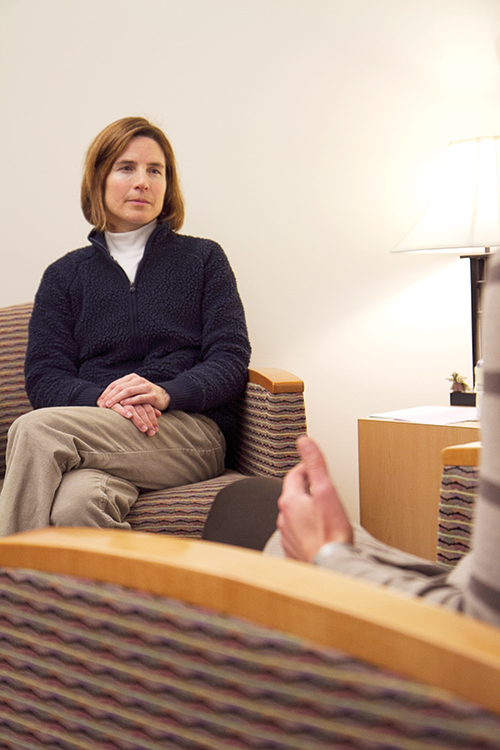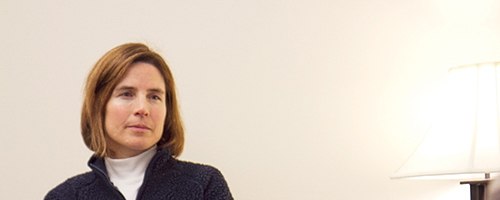For some Portland State students, winter term simply means shorter and chillier days. But for others it means depression, lethargy and a loss of interest in classes, friends and life in general.
Students struggle with winter blues

Marcy Hunt-Morse, director of counseling and psychological services at SHAC. Photo by Kayla Nguyen.
For some Portland State students, winter term simply means shorter and chillier days. But for others it means depression, lethargy and a loss of interest in classes, friends and life in general.
Seasonal Affective Disorder is a subcategory of depression that typically arises around November—when daylight is beginning to dissipate—and sticks around until springtime.
“In general, whether seasonal or happening at any time of the year, it has a profound affect on students,” said Dr. Marcy Hunt-Morse, psychologist and director of counseling and psychological services at PSU’s Center for Student Health and Counseling.
The most common symptoms of SAD are feelings of depression and anxiety, an increased need for sleep, loss of interest and a sense of isolation. Students may find it more difficult to go to class or work and may be less productive in general.
But staff members at SHAC want students to know that SAD is treatable and that students can get better.
“There are steps to managing those symptoms,” Hunt-Morse said.
Students can make an appointment to talk to a doctor or mental health professional at SHAC if needed.
While the exact cause of SAD is still unknown, decreased daylight may play a role.
Erin Bransford, fitness and health promotions coordinator at the Academic and Student Rec Center, said, “It can have something to do with a lack of vitamin D.”
According to Hunt-Morse, sunlight greatly affects serotonin—a chemical which, among other things, can affect a person’s mood.
SAD can also affect those who have bodies that are more sensitive to change in weather or adjustment to different levels of daylight.
Healthy U Wellness Challenge
The Healthy U Wellness Challenge is a nine-week competition,
from Jan. 14 to March 17, that promotes overall wellness and encourages everyone in the PSU community to develop healthy habits. Each week offers an assortment of events to choose from, ranging from “Understanding your Credit Score and Budgeting” to “Running Skills and Drills.” You can register as an individual or as a team, but hurry: If you want your points logged for the first week, register by Jan. 20. Members pay $10, nonmembers pay $20. For more information, check out wellness-challenge.pdx.edu.
Sitting in front of a light therapy box a few times per day can be an effective way to treat SAD.
“There’s still light. Even getting out for awhile to go for a walk outside helps,” Hunt-Morse said.
Another important thing to do any time of the year to help combat depression is exercise, and the Rec Center is a great place to start.
Any student taking one credit or more is automatically a member, and membership is included in tuition and fees.
The center offers activities and classes for students at any level, drop-in group fitness classes included.
“It takes your mind off what makes you depressed,” said Matthew Volk, a sophomore pre-nursing student.
It can sometimes be difficult for students to find time in their busy schedules to exercise, but finding something that motivates you can really help, Rec Center staff said. Whether it’s a specific activity, exercising with other people or working with a personal trainer, some kind of incentive or encouragement is key.
The social aspect of exercise can be beneficial to students both physically and emotionally.
The Healthy U Wellness Challenge, which began yesterday, offers a support system and incentives along the way to keep students motivated.
“The Healthy U Wellness Challenge supports all systems of wellness,” said Clara Fisher Johnson, marketing and outreach coordinator at Campus Rec. “You have a network.”
The sense of community gained from working out with others and the positive physical effects of exercise can really boost your mood.
“Cardio tends to have more of a positive effect because of the release of endorphins,” Bransford said.
The center offers a variety of activities, including basketball, ultimate Frisbee and tango, to name a few.
It’s important to be aware of other health risks while exercising in the winter, however. Hypothermia is one of them.
“Being wet and cold, there’s a high risk for that,” Bransford said.
If you’re heading outdoors for a workout, dress warmly in clothes that are rain resistant in order to stay dry. Staying hydrated is essential, too. This is especially imperative during the cold and flu season.
Hunt-Morse also suggested maintaining a regular sleep schedule and eating well in order to maintain optimum winter health.
Most importantly, make an appointment with a doctor or mental health professional if you feel something is up.
“Folks are more susceptible to colds and the flu, which can end up with them feeling overwhelmed,” Hunt-Morse said. “Seek help as soon as you’re aware. Talk to SHAC.”






